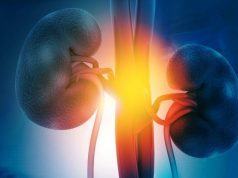Low albumin level is only variable independently associated with mortality during one-year follow-up
THURSDAY, June 1, 2017 (HealthDay News) — Low albumin levels at the start of renal replacement therapy are independently associated with mortality during one-year follow-up, according to a study published online May 23 in the Journal of Renal Care.
Ana Rebollo Rubio, Ph.D., from the Carlos Haya Regional University Hospital in Malaga, Spain, and colleagues conducted a one-year prospective follow-up study involving 189 patients. The authors analyzed sociodemographic variables, etiology of renal disease, comorbidities, prior nephrology service monitoring, prior renal transplantation, and biochemical parameters at the time of starting renal replacement therapy, and assessed their correlation with mortality.
The researchers found that 6.87 percent of participants died during one-year follow-up; 64 percent of the deaths occurred during the first six months. A low albumin level was the only variable independently associated with mortality.
“Although most patients in this center are monitored by a nephrologist prior to starting replacement therapy, many nevertheless fail to achieve the biochemical targets recommended. One such parameter is albumin, which proved at the start of replacement therapy to be an independent predictor of mortality,” the authors write. “Findings of this study show the need to intervene on certain biochemical parameters during the pre-dialysis stage and at the start of dialysis, in order to improve survival in this group of patients.”
Abstract
Full Text (subscription or payment may be required)
Copyright © 2017 HealthDay. All rights reserved.








